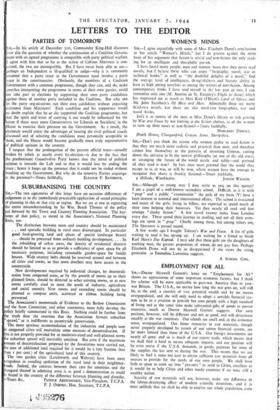SUBURBANISING THE COUNTRY
Sm,—The two signatories of this letter have on occasion differences of judgement as to the immediately practicable application of sound principles of planning to this or that city or region. But we are at one in regretting the entire misunderstanding by Sir Wm. Beach Thomas of the policy put forward by the Town and Country Planning Association. The key- otes of that policy, as stated in the Association's .National Planning sis, are: The distinction between town and country should be maintained . „ . and sporadic building in rural areas discouraged. In particular good food-growing land and places of special landicape beauty . should be protected from ordinary building development. .. . In the rebuilding of urban areas, the density of residential districts should be limited so as to provide a sufficiency of open space for all necessary purposes, including reasonable,. garden-space for family houses. Wide country belts should be reserved around and between all cities and towns, so that town dwellers may have access to the countryside. • New developments required by industrial changes, by decentrali- sation from congested areas, or by the growth of towns up to their planned limits, should be directed to other existing towns, or to new towns carefully sited to meet the needs of industry, agriculture and social amenity. New towns and extending towns should be planned as compact units, scattered or ribbon building being prevented. .
The Association's memoranda of Evidence to the Barlow Commission and the Scott Committee, and other statements, more fully develop the -cy briefly summarised in this Basis. Nothing could be further from truth than the assertion that the Association favours suburban sprawl,".or is indifferent to countryside preservation.
The more spacious accommodation of the industries and people now congested cities will necessitate some measure of decentralisation. If s is not properly provided for in moderate-sized and well-planned towns e suburban sprawl will inevitably continue. But even if the maximum ount of decentralisation proposed by the Association were carried out, e area of additional land required for it would be a tiny fraction (less an 1 per cent.) of the agricultural land of this country.
The two garden cities (Letchworth and Welwyn) have been most rupulous in avoiding spoliation of the rural land in their neighbour- . Indeed, the contrast between their care for amenities and the isregard thereof in adjoining areas is as good a demonstration as could found in the country of the difference between planning and disorder. Yours &c.. PATRICK ABERCROMBIE, Vice-President, T.C.P.A. F. J. OSBORN, Hon. Secretary, T.C.P.A.






















 Previous page
Previous page